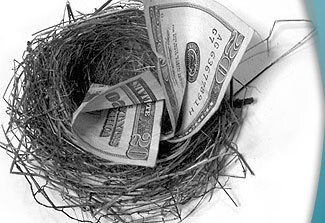The early bird catches the cash
SHARE markets are sinking, superannuation is slumping and interest rates are rising. The last thing on most people's minds is the end of the financial year.

The early bird catches the cash
SHARE markets are sinking, superannuation is slumping, interest rates are rising and the cost of living is soaring. The last thing most people want to think about is preparing themselves for the end of the financial year which, after all, is still two-and-a-half months away.
However, getting in early with superannuation and tax planning strategies can make life much easier during the traditional June rush, and also deliver some impressive financial benefits that otherwise might not be achievable.
Adelaide financial strategist Theo Marinis said some investors were getting set for the end of 2007-08 now.
"These are exciting times," Mr Marinis said.
"Investors are dealing with the reality of capital losses for the first time in about five years. However, the news is not all bleak, particularly if there are some capital gains in your portfolio to offset at tax time," he said.
Superannuation is a key area where it pays to plan early.
"Families with working members who earn less than $58,000 should also be considering if there is an opportunity to contribute up to $1000 to the lower paid member's super fund to take advantage of the federal government's co-contributions," Mr Marinis said.
"This is also a great way for grandparents to financially assist their grandchildren," he said. The full $1500 co-contribution is available to anyone earning less than $28,980 this financial year.
MLC has just released a booklet, Clever year-end strategies 2007-2008, for financial advisers to use with their clients.
It says people whose spouse earns a low income could consider making a contribution for their spouse to receive a tax offset of up to $540.
The spouse must earn $10,800 or less this financial year and $3000 needs to be contributed to their super to qualify for the full $540 offset.
Self-employed people or those no longer employed - such as retirees - can make personal contributions to super which could enable them to receive a tax deduction.
"Contributing to superannuation can help ensure you don't put all the eggs in the one basket - that is, your business. Through superannuation you can select a mix of assets including cash, bonds, property and shares to help you achieve your lifestyle and financial goals," MLC says.
"If you make a capital gain on the sale of an asset this financial year, you should consider making a personal deductible contribution into superannuation before 30 June. If eligible, this strategy may enable you to save on capital gains tax this financial year and increase your retirement savings."
Mr Marinis said for those who could afford it, now was a great time to be investing up to the $50,000 limit per person into superannuation ($100,000 a year for over-50s until 2012).
"The shares your fund may be buying could be around 20 per cent cheaper now than they were in November, so you will be getting great value for money," he said.
"And if you are self employed there is a great 100 per cent tax deduction - up to $50,000 - available for super contributions.
"Also, if you have a self-managed super fund, now might be the time to unload some of the underperforming shares you acquired along the way. You should also make sure your death and TPD life insurances are held within the SMSF as they are a tax deduction within this structure".
Mr Marinis said it was a good idea to turn superannuation strategies into action before the May Budget as the new Federal Government might change the rules. Traditionally old rules were grandfathered - which means left the same - for people who acted in good faith at the time, he said.
"Of course, by getting yourself set by May, you may risk the government improving some conditions. However, given the economic cycle, it is difficult to see more generous improvements coming in the short-term." MLC says here are also many tax strategies that can be undertaken now.
A key one is to use losses on some investments to reduce capital gains tax payable on other investments.
"If you have to pay capital gains tax this financial year, you should consider selling poor performing assets that no longer suit your circumstances," MLC says.
"By selling a poor performing asset, you can use the capital loss you incur to offset a realised capital gain from another asset in the same financial year."
Only 50 per cent of the capital gain is taxable if the asset has been held for more than a year.
Other strategies to reduce tax include prepaying things such as interest on investment loans or income protection insurance premiums, MLC says.
"The additional tax deduction could help you to reduce your taxable income and result in some significant tax savings this financial year."
Mr Marinis said investors should speak with their financial adviser and tax expert to discuss their situation.
"People need to remember that it is not only a case of which investment they choose to sell down, if that is their strategy, but it can also be which tranches of shares within the investment, or which units in a managed fund, they should sell as this can make a significant difference to the tax paid," he said.
Mr Marinis said people planning to retire soon would be disappointed by the recent market downturn but should not be "broken-hearted".
"They should discuss a transition to retirement approach with their adviser - and they may be surprised that they may even be advised to stop paying the principal off on their home loan in order to tax effectively super charge their superannuation, depending on their personal circumstances," he said.



